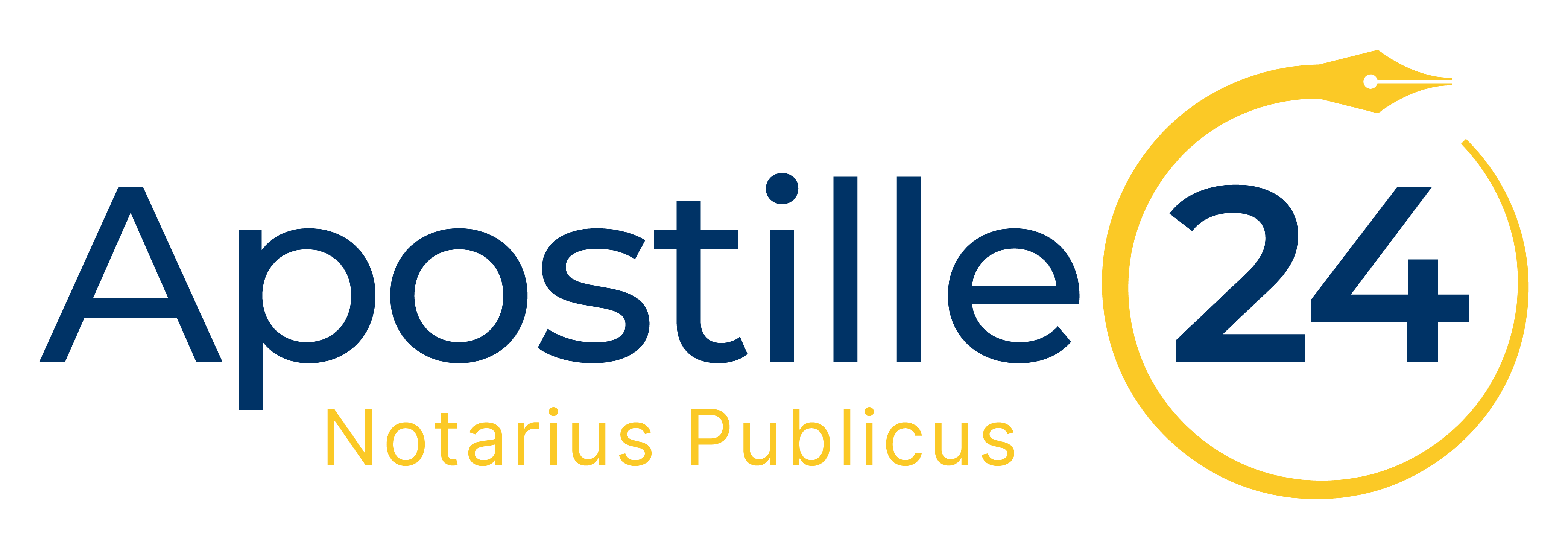An apostille is a form of authentication or certification issued by a designated authority in a country that is a party to the Hague Apostille Convention. It verifies the authenticity of a public document or department of state, such as birth certificates, marriage certificates, educational diplomas, or legal and other documents elsewhere, for use in another member country without the need for further legalization.
Essentially, an apostille ensures that a document issued in one country is recognized and accepted as valid in the Department of State in another country.
Obtaining an apostille is crucial for individuals or organizations needing to use official documents internationally.
Without an apostille, documents may not be recognized as valid by foreign authorities or institutions, potentially causing delays or complications in various processes such as immigration, employment, education, business transactions, or legal matters.

H2: Identifying Documents Requiring Apostilles
When determining other countries in which federal documents require apostilles, it’s essential to consider their intended use and the requirements of the country where they will be presented. Here’s some guidance on identifying such federal documents elsewhere:
- Legal or Notarized Documents:
Documents that have been notarized or certified by a legal authority often require apostilles. This includes contracts, powers of attorney, affidavits, and sworn statements. - Vital Records:
Vital records such as birth certificates, marriage certificates, and death certificates commonly need apostilles, especially for purposes like immigration, adoption, or establishing citizenship in another country. - Educational Documents:
Academic transcripts, diplomas, degrees, and other educational credentials may require apostilles for recognition by foreign educational institutions, employers, or government agencies. - Business Documents:
Business-related documents such as articles of incorporation, certificates of good standing, and licenses may need apostilles for international business transactions, partnerships, or expansion. - Legal Proceedings Documents:
Documents related to legal proceedings, such as court orders, judgments, or divorce decrees, may require apostilles for enforcement or recognition in another country.
H2: Examples of Common Documents Requiring Apostilles:
- Birth Certificates:
Often needed for purposes like international adoption, immigration, or marriage abroad.
- Marriage Certificates:
Required for proving marital status or changing marital status in another country.
- Academic Transcripts:
Necessary for admission to foreign educational institutions or for employment purposes overseas.
- Diplomas or Degrees:
Required for academic or professional recognition in another country.
- Power of Attorney:
Needed for granting legal authority to act on behalf of someone else in another country.
- Articles of Incorporation:
Necessary for establishing or operating a business entity in a foreign jurisdiction.
- Court Orders or Judgments:
Required for enforcing legal decisions or resolving disputes across borders.
By understanding the types of documents that typically require apostilles and their specific purposes, individuals can ensure they obtain the necessary authentication for smooth international transactions and legal recognition.

H2: Tips for Ensuring Document Accuracy and Proper Authentication:
- Review Documents Carefully:
Thoroughly review all documents to ensure they are accurate, complete, and free of errors or discrepancies. Check names, dates, and other relevant information for accuracy. - Update Documents if Necessary:
If any documents are outdated or contain incorrect information, take the necessary steps to obtain updated versions before proceeding with the apostille process. - Follow Notarization Guidelines:
If documents require notarization, ensure they are properly notarized by a qualified notary public. Follow all guidelines and requirements for notarization, including providing valid identification and signing in the presence of the notary. - Verify Authenticity of Signatures:
Confirm that all signatures on the documents are authentic and legally valid. Ensure that signatories have the authority to sign the documents and that their signatures are genuine. - Obtain Required Legalizations:
If documents require additional legalizations or certifications before obtaining an apostille, such as embassy legalization or consular authentication, make sure to complete these steps according to the relevant jurisdiction’s requirements. - Use Official Document Copies:
Provide official copies of documents issued by the appropriate authorities. Avoid submitting photocopies or unofficial versions of documents, as these may not be accepted for apostille authentication. - Translate Documents if Necessary:
If documents are in a language other than the official language of the country where the apostille will be obtained, ensure they are translated accurately by a qualified translator. Submit both the original documents and their translated versions for authentication. - Keep Track of Document Versions:
Maintain clear records of all document versions and updates throughout the authentication process. Keep copies of both the original documents and any amended or updated versions for reference. - Seek Professional Assistance if Needed:
If you are unsure about any aspect of the document authentication process, seek guidance from legal professionals, notaries, or agencies specializing in apostille services. They can provide valuable advice and assistance to ensure your documents are properly prepared and authenticated.
By following these tips and taking proactive measures to ensure document accuracy and proper authentication, you can streamline the apostille request process and avoid delays or complications in obtaining apostilles for your important documents.

H2: Completing the Apostille Application Process:
- Obtain the apostille application letter and form from the relevant authority in your jurisdiction, typically the government office responsible for issuing apostilles.
- Fill out and submit the application form accurately and completely, providing all required information about yourself, your physical address, and the documents for express services for which you are requesting apostilles.
- Ensure that all documents requiring apostilles are properly certified copies notarized or authenticated according to the jurisdiction’s requirements.
- Review the application form and accompanying documents to ensure they meet all specified criteria.
- Submit the completed application form and accompanying documents to the designated authority along with a return envelope with any required fees.
H3: Required Forms, Fees, and Submission Methods
- The specific forms required for the apostille application process may vary depending on the state’s office jurisdiction. Obtain the necessary forms from the appropriate county government office or website.
- Fees for document apostille services also vary by jurisdiction and may depend on factors such as the number of documents being apostilled and the processing time requested.
- Payment methods for apostille fees may include cash, check, money order, or electronic payment, depending on the accepted methods of the issuing authority.
- Submission methods may include in-person submission at a government office or mailing address, mail-in application, or online submission through a designated portal or website.
H3: Waiting for Processing
- After submitting your apostille application, allow sufficient time for processing. Processing times may vary depending on factors such as the volume of applications and the processing procedures of the issuing authority.
- To monitor the status of your application, check the designated authority’s website or contact their customer service department for updates.
- If necessary, follow up with the issuing authority to inquire about the status of your application and address any concerns or issues that may arise during processing.
H3: Receiving the Apostille
- Once your apostille has been issued, you will be notified by the issuing authority through the contact information provided on your application page.
- Retrieve your apostilled documents from the designated authority according to their instructions.
- Review the apostille carefully to ensure it contains all necessary information and is properly affixed to the documents.
H3: Verifying the Authenticity of the Apostille
- If needed, verify the authenticity of the apostille by contacting the issuing authority directly or using any available online verification tools provided by the authority.
- Compare the details on the apostille with the information provided on the original documents to confirm the accuracy and authenticity of the original document.
Apostille24 offers professional assistance with the apostille application process, ensuring a smooth and efficient experience from start to finish. With our expertise and dedication to customer satisfaction, Apostille24 can help you obtain apostilles for your documents with ease and confidence.

